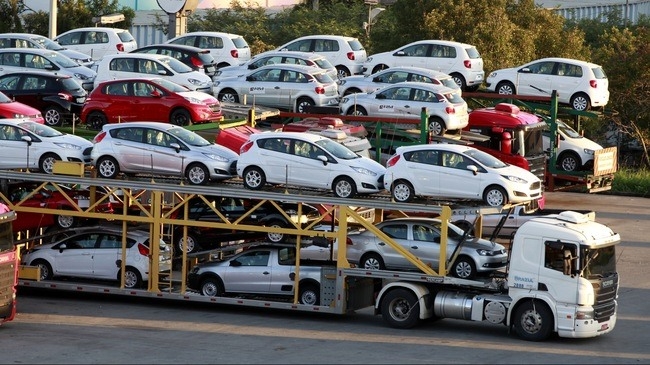Importing Used Cars from GCC
Introduction
The Royal Oman Police (ROP) and the General Directorate of Customs and Traffic have announced new regulations that will significantly affect the import of used vehicles from GCC countries into Oman. Starting July 1, 2025, importers will no longer be able to bring cars into Oman using the traditional clearance certificate system. Instead, every imported vehicle must have an official export certificate issued by the competent authority in the vehicle’s country of registration. Get ready for Oman Motor Show 2025.

This rule aims to tighten regulations, enhance transparency, and protect Omani consumers from fraudulent or poorly documented vehicle imports. The change will affect car dealerships, import businesses, and private buyers who rely on vehicles from neighboring countries such as the United Arab Emirates, Saudi Arabia, Kuwait, Qatar, and Bahrain.
Why Did Oman Change the Import Rules?
For years, the clearance certificate system allowed vehicles to enter Oman with proof that the car had no fines, debts, or unpaid taxes in the GCC country. However, this process did not ensure full legal documentation, leaving room for fraud, mismatched records, and risks to consumers.
The new export certificate requirement ensures:
-
- Legal traceability – Every car must be officially de-registered in the country of origin.
-
- Consumer protection – Buyers in Oman will receive vehicles with verified histories.
-
- Regulatory compliance – Prevents illegal imports, duplicate registrations, or smuggling.
-
- Transparency for dealers – Dealers can assure customers of a vehicle’s legal background.
Officials note that this change aligns with Oman’s Vision 2040 goals of modernizing trade regulations and safeguarding consumer rights.
Who Will Be Affected by the New Rules?
Dealers & Importers
-
- Car dealerships importing used vehicles from the GCC must now obtain export certificates, which may increase documentation costs and processing times.
-
- Importers without proper paperwork risk rejection of their vehicles at Oman’s borders.
Private Buyers
-
- Individuals buying used cars from Dubai, Saudi Arabia, or other GCC markets must ensure the seller provides an export certificate.
-
- Anyone planning to bring a car into Oman after July 1, 2025, must double-check compliance to avoid delays or additional fees.
Customs & Border Authorities
-
- ROP and Customs officers will have stricter verification roles, ensuring only properly documented vehicles enter Oman.
Impact on the Omani Used Car Market
The announcement is expected to cause short-term disruptions in the used car market:
-
- Price Changes – Import costs may rise, pushing up second-hand car prices in Oman.
-
- Demand Shift – Buyers may prefer vehicles already available in Oman rather than face import complexities.
-
- Market Adjustment – Dealers may need to partner with trusted exporters in the GCC to streamline certificate issuance.
In the long run, however, the rule is expected to strengthen consumer trust in imported vehicles and foster a healthier, more transparent market. Why shift toward Chinese & Korean car brands in 2025.
How to Import a Used Vehicle Under the New Rules
From July 2025, importers and buyers must follow these steps:
-
- Obtain an Export Certificate – Request this document from the official traffic authority in the vehicle’s country of origin.
-
- Verify Compliance – Ensure the certificate is authentic and includes the correct chassis number, engine number, and ownership details.
-
- Submit at Customs – Present the export certificate along with other required documents (purchase invoice, insurance, ID, etc.) at the Omani border.
-
- Pay Fees & Duties – Settle applicable import duties, registration fees, and taxes.
-
- Complete ROP Registration – Once cleared, register the vehicle with Oman’s traffic authorities.
Expert Opinions
According to auto industry analysts, the regulation is a necessary reform:
-
- It reduces risks for consumers who might unknowingly purchase cars with hidden legal issues.
-
- It discourages unlicensed traders who exploited loopholes in the clearance certificate system.
-
- It will lead to higher quality imports, although buyers should expect slightly higher prices initially.
Dealers are also calling for awareness campaigns to educate customers and streamline export certificate processing across GCC countries.
Conclusion
Oman’s new vehicle import rules mark a turning point for the automobile sector. By replacing clearance certificates with export certificates, the government is ensuring a safer, more transparent, and consumer-friendly market. While the transition may bring short-term challenges, the long-term benefits include greater trust in the used car market and alignment with international best practices.
For car buyers and dealers, the message is clear: prepare now, update your processes, and ensure compliance before July 2025.
Frequently Asked Questions (FAQs)
1. When do the new rules take effect?
July 1, 2025.
2. Can I still use a clearance certificate?
No, clearance certificates will no longer be valid for importing used cars into Oman.
3. What is an export certificate?
An official document issued by the vehicle’s registration authority in the GCC country, proving the car has been legally de-registered and is ready for export.
4. Will this affect car prices in Oman?
Yes, used car prices may rise slightly due to stricter compliance and additional paperwork.
5. What should I do if I plan to import a car soon?
If your car arrives before July 1, 2025, the old rules may still apply. After that, an export certificate will be mandatory.
